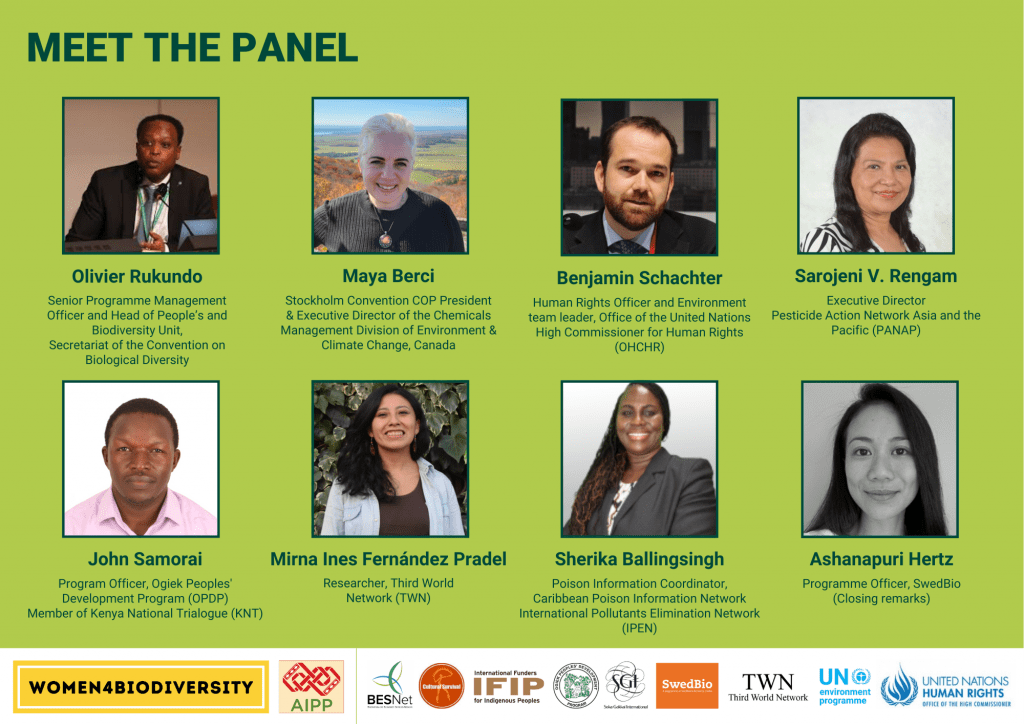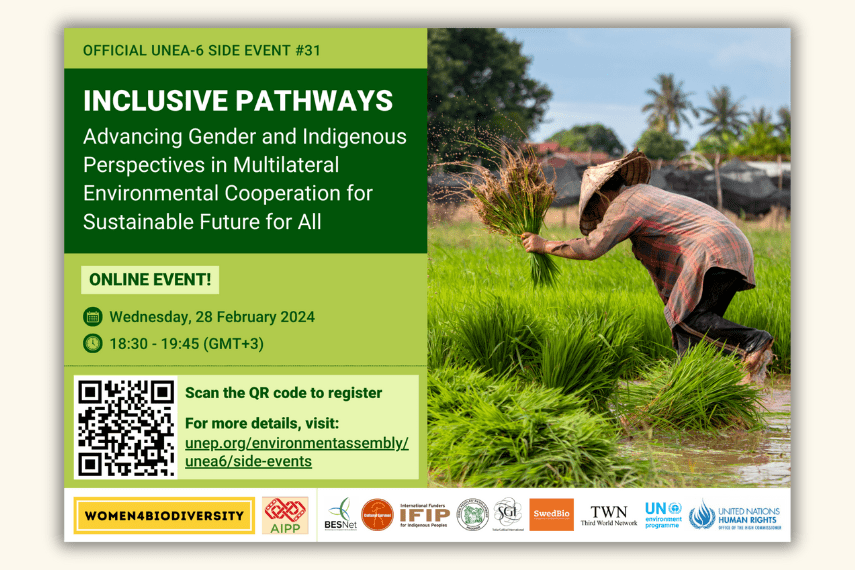OFFICIAL UNEA 6 SIDE EVENT #31
WHAT
A 1.5-hour online panel discussion on the critical role of human rights-based approach (HRBA), gender perspective and the work with Indigenous Peoples and local communities in environmental efforts at the Sixth United Nations Environment Assembly at Nairobi (UNEA 6), Kenya from 26 February to 1 March 2024.
WHEN
Wednesday, 28 February 2024.
18.30 hours to 19.45 hours East Africa Time. Please convert your time and date here.
WHERE
Online. Zoom. Registration link here.
WHO
Keynote: Olivier Rukundo, Senior Programme Management Officer and Head of Unit at the Secretariat of the Convention on Biological Diversity
The panel will include,
- Maya Berci, Stockholm Convention COP President and Executive Director of the Chemicals Management Division of Environment and Climate Change, Canada
- Benjamin Schachter, Human Rights Officer and Environment team leader at the Office of the United Nations High Commissioner for Human Rights (OHCHR)
- John Samorai, Ogiek Peoples’ Development Program (OPDP) and Kenya National Trialogue
- Mirna Ines Fernandez, Third World Network (TWN)
- Sarojeni V. Rengam, Executive Director, Pesticide Action Network Asia and the Pacific (PANAP)
- Sherika Ballingsing, Poison Information Coordinator, Caribbean Poison Information Network, International Pollutants Elimination Network (IPEN)
Concluding Remarks: Ashanpuri Hertz, SwedBio
Moderator: Mrinalini Rai, Women4Biodiversity
WHY
- To share examples of how Indigenous Peoples’ and Local Communities (IPs and LCs) perspectives enrich the uptake of or/and creation of knowledge on nature.
- To understand the critical role of HRBA and gender responsiveness in Multilateral Environmental Agreements (MEAs), such as CBD, the United Nations Framework Convention on Climate Change (UNFCCC), and the United Nations Convention to Combat Desertification (UNCCD).
- To contribute and provide recommendations to Item 10 of UNEA6 and the High Level on the importance of cooperation with MEAs that will take place on 28 February.

Summary of the event
Women4Biodiversity co-led an official online side event at the 6th United Nations Environment Assembly (UNEA-6), titled “Inclusive Pathways: Advancing Gender and Indigenous Perspectives in Multilateral Environmental Cooperation for a Sustainable Future” organised along with Asia Indigenous Peoples Pact (AIPP), Cultural Survival, InternationalFundforIndigenousPeoples(IFIP), Soka Gakkai International, SwedBio at Stockholm Resilience Centre, UN Development Programme (UNDP), UN Environment Programme (UNEP), Office of the High Commissioner for Human Rights (OHCHR), and International Fund for Indigenous Peoples (IFIP).
This 1 hour 15 minutes side event focused on the critical role of a human rights-based approach (HRBA), gender perspective and the work with Indigenous Peoples’ and Local Communities (IPs and LCs) in environmental efforts.
The event started with Olivier Rukundo, Senior Programme Management Officer and Head of Unit at the Secretariat of the Convention on Biological Diversity (CBD) talking about the new programme of work within Article 8J of the CBD where there are specific sections that focus on HRBA and gender-responsiveness, remarking that this is a good specific action to move forward with.
The next speaker Maya Berci, Stockholm Convention COP President and Executive Director of the Chemicals Management Division of Environment and Climate Change Canada, summarised her presentation by stating that chemicals are harmful if they are not properly managed, and have distinct impacts on women and girls. Vital safety information and labelling on agricultural products are needed as these tend to be more harmful to women increasing their exposure to harmful chemicals. Berci further stressed that there are several global conventions created for sound management of chemicals and waste which include the Basel Convention, the Rotterdam Convention and the Stockholm Convention. However, there is a need to strengthen regulations on chemicals that disproportionately affect women and girls. Thus, integrating gender mainstreaming and gender equality should be at the heart of implementation at ground level.
There is a need to strengthen regulations of chemicals that disproportionately affect women and girls. Several global conventions are put together for the sound management of chemicals and waste which include the Basel Convention, the Rotterdam Convention and the Stockholm Convention…Integrating gender mainstreaming and gender equality should be at the heart of implementation.
Maya Berci
Benjamin Schachter, Human Rights Officer and Environment team leader at the Office of the United Nations High Commissioner for Human Rights (OHCHR), expressed that gender equality is a human right, especially in HRBA. Major multilateral agreements have gender equality as well as rights of Indigenous Peoples’ and Local Communities (IPs and LCs) provisions that are critical to note and allow for a cross-cutting element. However, to exercise the right to a healthy environment, one needs to have access to remedy and access to justice, and the RIO Convention 10 addresses this. Schachter further stated that rights are tools to ensure accountability and urged everyone to exercise their right to a healthy environment for the present and future generations.
John Samorai, from the Ogiek Peoples’ Development Program (OPDP) and Kenya National Trialogue, talked about the values and traditions of the Ogiek people that are strong, and important and their contributions towards conservation are of great significance. The biggest challenge that the Ogiek people is facing is around land tenurial security and the need for HRBA to recognize their territorial rights. Samurai called for Ogiek peoples’ meaningful participation based on their experience.
Mirna Ines Fernandez, from Third World Network (TWN), called for full and effective participation of the rights holders (IP and LCs, women and girls, youth, farmers, and environmental human rights defenders) on the very design of the policies to be implemented on the ground. It is crucial as they are the real experts who would be able to provide the true realities of the ground. Fernandez also talked about the rights holders getting access to financing, and the importance of safeguarding land rights for women. She also talked about the consistency in the implementation of the multilateral agreements especially in the context of HRBA.
Sarojeni V. Rengem, Executive Director, of Pesticide Action Network Asia Pacific (PANAP) also spoke along the same lines. Although major guidelines like the Sustainable Development Goals (SDGs) exist, there has been little achievement in gender equality. The discrimination faced by women, especially rural women, indigenous women and women farmers is still stark. Not only in terms of social and economic exclusion but also based on ethnicity, age, nationality, caste, and sexual orientation. Less than 20% of women in Asia hold land tenure. Discrimination begins at home and permeates all levels. Rengem called for the policies to be reflected on the ground and to build capacities of women, especially in food security, and sovereignty and livelihood.
The last speaker, Sherika Ballingsingh Poison Information Coordinator, Caribbean Poison Information Network, International Pollutants Elimination Network (IPEN), emphasized that women are the pathways to chemical exposure for the human race. When women are exposed to chemicals, it affects from the mother to the foetus. She further stressed that we should not work in silos but work together and strengthen the work in building HRBA for chemical exposure.
Lastly, Ashanapuri Hertz, Program Officer, SwedBio, reiterated and summarised the overarching theme of the event. HRBA should be integrated into all Multilateral Environmental Agreements (MEAs) especially to address the discrimination and disadvantages faced by all women and girls. One of the biggest steps should be the full and meaningful participation of women and girls while acknowledging the knowledge of IPs and LCs that can contribute to science and policies. Participation is not just about adding seats to the table. While all speakers come from diverse experiences and backgrounds, we all share a common thread, which goes to show the importance of collaboration and the need to come together to build capacities and share our experiences and stories to inform the policies.
The event was moderated by Mrinalini Rai, the Director of Women4Biodiversity.

